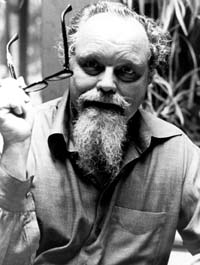Lou Harrison
by Frederick D. Fairchild
(b. Portland, Oregon, USA May 14, 1917, d. Feb, 2, 2003)
Lou Harrison is one of our most influential percussion composers and innovators. His career has included work as a composer, performer, teacher, musical theorist, ethnomusicologist, conductor, instrument maker, poet, calligrapher, critic, polemicist, dancer, puppeteer and playwright.
 Harrison received his earliest training in piano and dance, later taking up composition, and finally studying music at San Francisco State College. His interest in writing music for percussion dates from the 1930s when he heard the ostinatos in a Henry Cowell theater work. From 1934 to 1935 he studied with Cowell, having previously taken his University of California Music of the Peoples of the World course.
Harrison received his earliest training in piano and dance, later taking up composition, and finally studying music at San Francisco State College. His interest in writing music for percussion dates from the 1930s when he heard the ostinatos in a Henry Cowell theater work. From 1934 to 1935 he studied with Cowell, having previously taken his University of California Music of the Peoples of the World course.
While teaching at Mills College (1936-39), Harrison began to present percussion concerts with John Cage. From 1939-41 came a great outpouring of pieces, many of which have become standard works in the percussion ensemble repertoire, including "Bomba" (1939), "Concerto No. I for Flute and Percussion" (1939), "Concerto for Violin and Percussion Orchestra" (1940), "Canticle No. 1" (1940), "Canticle No. 3" (1940), "Labyrinth" (1941), and "Fugue" (1941). In one concert, held in San Francisco's California Hall in 1941, Harrison and Cage pieces were played alternately, closing with the premiere of the collaborative "Double Music."
He moved to Los Angeles in 1941 where he studied at UCLA with Arnold Schoenberg, and where he also became involved in the University's dance department.
From 1943, the year he moved to New York, he wrote extensively, serving as music critic for the New York Herald Tribune (1943-48) and contributing to View and Modern Music. For a time he edited the New Music Edition. Composer and critic Virgil Thomson became an enthusiastic proponent of Harrison's music, and Harrison himself put forth the causes of Ruggles, Varese, Cowell, and Ives, editing major works of the latter and, on Nov. 3, 1947, conducting the world premiere of Ives' "Third Symphony."
In the late 1940s Harrison taught in Portland and at the innovative Black Mountain College in North Carolina. He received his first Guggenheim Fellowship in 1952. Returning to California in 1953, an earlier interest in tuning systems and instrument building was rekindled by his meeting and subsequent friendship with Harry Partch.
More honors and awards followed including a second Guggenheim Fellowship in 1954, a Fromm Award and a commission from the Louisville Symphony in 1955, and a Rockefeller Grant in 1960, which allowed Harrison to study various aspects of Asian music in Tokyo, Taiwan, and Korea. In 1963, he received an appointment as senior scholar at the University of Hawaii East West Center.
In 1965, he received a Phoebe Ketchum Thorne Award to undertake research in Oaxaca, Mexico. He started teaching at San Jose State University in 1967, subsequently performing and lecturing on both his own and oriental music.
During the late 1960s he spent a great deal of time designing and building instruments with his life companion William Colvig. This latter collaboration resulted in the American gamelan, which provided Harrison with an important vehicle for composition and performance, including such works as "Heart Sutra" (1972) and "Suite for Violin and American Gamelan" (1974).
He became music director of the Red Gate Shadow Players (1970), was elected to the American Academy of Arts and Letters (1973), developed and taught his World Music Theory course (1974-82), and served as American representative to the League of Asian Composers (1975).
Harrison also became an expert in the Indonesian gamelan and, in 1977, built two Javanese gamelans with William Colvig. He was a Fulbright senior scholar in New Zealand in 1983, subsequently becoming involved in recordings and international performances of his works. He served in the Darius Milhaud Chair of Musical Composition at Mills College from 1980 until his retirement in 1985.
At PASIC '80 in San Jose, Harrison presented workshops on gamelan, gave performances of his "La Koro Sutro" and "Scenes from Cavafy," and served as the featured speaker at the banquet.
Lou Harrison is responsible not only for providing some of the most important works in the percussion repertoire, but for pioneering the expansion of percussion ensembles by the use of "found objects," the addition of non-Western instruments, the use of newly invented instrumental resources, and for introducing us to his sensitive, lyrical compositional style.